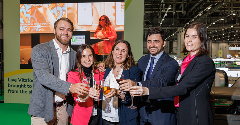News
Nestlé to expand Singapore presence
8 Apr 2016Nestlé is to expand its research and innovation activities in Asia with the establishment of Nestlé Research Centre (NRC) Asia in Biopolis, the biomedical research hub of Singapore.

Nestlé is to expand its research and innovation activities in Asia with the establishment of Nestlé Research Centre (NRC) Asia in Biopolis, the biomedical research hub of Singapore. The expansion builds on Nestlé’s strategic innovation partnership with Singapore’s Agency for Science, Technology and Research (A*STAR), and provides a new base for Nestlé Research Centre, with a focus on Healthy Ageing.
Longer life expectancy and a marked decline in fertility rates have resulted in a rapidly ageing global population, the company notes, with significant economic, healthcare and societal repercussions. In particular, it says, Asia’s ageing population is expected to reach 1.2 billion and account for 60 per cent of the world’s population of older people by 2050 Nestlé said it has identified a strategic need for a research footprint within Asia to study the role of nutrition and early development in health and disease, so as to better address the needs of the region’s ageing population. NRC Asia’s strong focus on Healthy Ageing leverages Singapore’s strong biomedical research capabilities and diverse ethnic population to enrich the wellbeing, health and longevity of Asia’s aged. The regional insights gleaned on geriatric nutrition could also lead to nutritional interventions across the globe. The company says that the establishment of NRC Asia builds on the success of Nestlé’s strategic innovation partnership with A*STAR, Singapore's lead public sector research agency driving economic-oriented research. The origins of Nestlé’s partnership with A*STAR date back to 2011, when NRC began collaborative projects in clinical nutrition research with A*STAR’s Singapore Institute for Clinical Sciences (SICS). Since then, the partnership has gone from strength to strength, giving Nestlé the confidence to anchor NRC Asia in Singapore. NRC Asia’s scope of research encompasses both new and existing platforms which have been jointly developed with A*STAR. Since the signing of a Framework Research Agreement with A*STAR in Jan 2014, Nestlé Research has set up strategic platforms around food science and technology, materials science and packaging, nutrition, health and behaviour. The collaboration will also increasingly expand on biotransformation – the use of natural processes, such as fermentation, to transform raw materials into ingredients with nutritional or functional benefits. The ongoing research collaborations between both partners are already delivering impactful outcomes, Nestlé claims. An example is a project to improve the sustainable use of raw materials, such as barley, in Nestlé’s malt extract production. A team from Nestlé, and A*STAR’s Institute of Chemical and Engineering Sciences (ICES) and Bioprocessing Technology Institute (BTI) have achieved break-through results in Nestlé’s malt extraction process. The result: the sustainability of Nestlé’s malt extraction facility in Singapore has been boosted, furthering Nestlé’s commitment to environmental sustainability. With the new focus on Healthy Ageing, key platform projects between Nestlé and A*STAR are also in progress. One such project, a multi-party collaboration with Nestlé, A*STAR’s Singapore Immunology Network (SIgN), the National University of Singapore (NUS) and Sanofi Pasteur rides on an existing vaccination study in the elderly. It seeks to understand the role of nutrition and lifestyle on immune robustness and frailty, with the end goal of developing nutritional interventions to improve immunity and wellbeing in the elderly. NRC Asia will be situated within Singapore’s Biopolis, alongside A*STAR’s biomedical research institutes. With the centre’s close proximity to private and public sector research at Biopolis as well as neighbouring hospitals and universities. Nestlé is expected to increase its total headcount at NRC Asia by 25 in the next three to five years.Related news

Our most-read articles of 2025
23 Dec 2025
From trade tariffs to heavy metals in protein, we look back at some of the industry’s highlights of 2025 and round up our most-read stories of the year.
Read more
Bigging up bean-based products and consumption in Britain
19 Dec 2025
Non-profit organisation the Food Foundation has launched a campaign, “Bang in Some Beans”, designed to increase UK consumers’ legume consumption.
Read more
Ingredient transparency key to success in European natural health market
12 Dec 2025
Europe’s $40.7 billion supplements market is growing fast, fuelled by demand for products that support healthy ageing, mental wellbeing, and preventive health, say experts.
Read more
Whole Foods Market forecasts fibre frenzy for 2026
11 Dec 2025
Whole Foods Market has released its top 2026 trends, predicting that a fibre frenzy will take place next year as health-conscious consumers seek out nutritious, filling options.
Read more
Sorghum emerges as better-for-you hero ingredient
9 Dec 2025
With the launch of Novak Djokovic’s sorghum-based brand, the grain’s popularity in the better-for-you snacking sphere is on the rise, thanks to its nutritional and sensory properties.
Read more
Innovation promise in 'maturing' plant-based dairy alternatives market
8 Dec 2025
Plant-based dairy is a maturing market that still faces significant hurdles around taste, functionality, nutrition, and price, but industry is innovating fast, according to experts speaking at Fi Europe.
Read more
Celebrating the winners of the Fi Europe Innovation Awards 2025
3 Dec 2025
Food industry stakeholders celebrated as the winners of the Fi Europe Innovation Awards were announced at a ceremony in Paris.
Read more
Apply now for the Vitafoods Europe Innovation Awards 2026!
28 Nov 2025
Entries for the Vitafoods Europe Innovation Awards 2026 are now open! Game-changing companies have until 27 February to submit their entry across eight categories for the chance to win big.
Read more
Concerns swirl around cinnamon’s compliance with EU law
25 Nov 2025
Cinnamon may be a top functional ingredient, but it needs stronger protocols to ensure it meets EU food safety laws and quality standards, say researchers.
Read more
Bone broth: From old-fashioned to en vogue
24 Nov 2025
OXO’s entry into bone broth has turned the spotlight on this small but high-performance category – and there is still scope for growth, especially in the area of GLP-1 support.
Read more